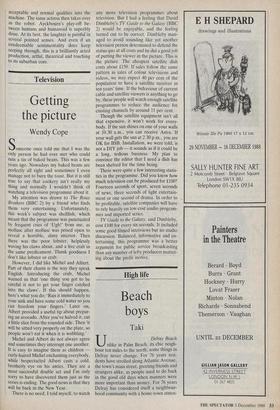Television
Getting the picture
Wendy Cope
Someone once told me that I was the Only person he had ever met who could ruin a tin of baked beans. This was a few Years ago. Nowadays my baked beans are perfectly all right and sometimes I even manage not to burn the toast. But it is still true to say that cookery isn't really my thing and normally I wouldn't think of watching a television programme about it.
My attention was drawn to The Roux Brothers (BBC 2) by a friend who finds them very entertaining. Unfortunately, this week's subject was shellfish, which meant that the programme was punctuated by frequent cries of 'Ugh!' from me, as mollusc after mollusc was prised open to reveal a horrible, slimy interior. Then there was the poor lobster, helplessly waving his claws about, and a live crab in the same predicament. Thank goodness I don't like lobster or crab.
However, I did like Michel and Albert. Part of their charm is the way they speak English. Introducing the crab, Michel warned us that 'one thing you got to be careful is not to get your finger catched into the claws'. If this should happen, here's what you do: 'Run it immediately to your sink and have some cold water so you can freedom your fingers.' Later on, Albert provided a useful tip about prepar- ing an avocado. After you've halved it, cut a little slice from the rounded side. Then 'it will be sitted very properly on the plate, so people won't eat it when it is wobbling.'
Michel and Albert do not always agree and sometimes they interrupt one another. It is easy to imagine them as children — curly-haired Michel enchanting everybody, While bespectacled Albert casts a cold, brotherly eye on his antics. They are a most successful double act and I'm only sorry to have discovered them just as the series is ending. The good news is that they will be back in the New Year.
There is no need, I told myself, to watch
any more television programmes about television. But I had a feeling that David Dimbleby's TV Guide to the Galaxy (BBC 2) would be enjoyable, and the feeling turned out to be correct. Dimbleby man- aged to avoid sounding like yet another television person determined to defend the status quo at all costs and he did a good job of putting the viewer in the picture. This is the picture. The cheapest satellite dish costs about £150. If sales follow the same pattern as sales of colour televisions and videos, we may expect 40 per cent of the population to have a satellite receiver in ten years' time. If the behaviour of current cable and satellite viewers is anything to go by, these people will watch enough satellite programmes to reduce the audience for existing channels by around 11 per cent.
Though the satellite equipment isn't all that expensive, it won't work for every- body. If the sun shines on one of your walls at 10.30 a.m., you can receive Astra. If your wall gets the sun at 2.30 p.m., you are OK for BSB. Installation, we were told, is not a DIY job — it sounds as if it could be a long, tedious business. My plan to convince the editor that I need a dish has been shelved for the time being.
There were quite a few interesting statis- tics in the programme. Did you know how much television can be produced for £100? Fourteen seconds of sport, seven seconds of news, three seconds of light entertain- ment or one second of drama. In order to be profitable, satellite companies will have to rely heavily on low-cost studio program- mes and imported series.
TV Guide to the Galaxy, said Dimbleby, cost £100 for every six seconds. It included some good filmed interviews but no studio discussion. Balanced, informative and en- tertaining, this programme was a better argument for public service broadcasting than any number of lefty producers mutter- ing about the profit motive.


































































 Previous page
Previous page